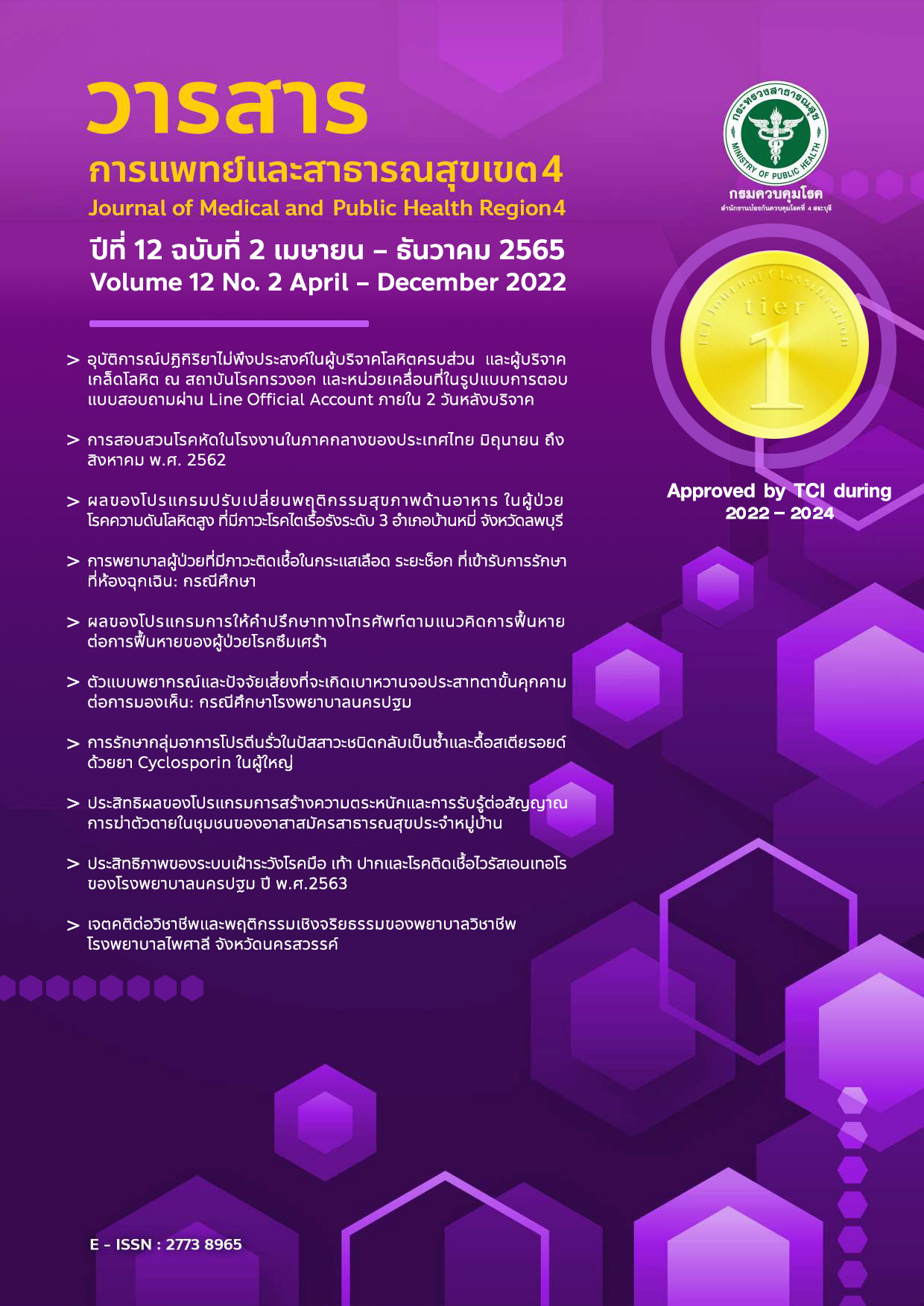The effect of telephone counselling program to the recovery of patients with major depression
Main Article Content
Abstract
The main goal of care for depressive patients was the recovery. Therefore, after they were hospitalization ends. They needed ongoing psychosocial therapy in order to lead an efficient life. This purpose of this quasi-experimental posttest with control group research was to examine the effect of telephone counselling program to the recovery in patients with major depression. The subjects were 56 patients diagnosed with major depressive disorder admitted in psychiatric hospital. They were random assigned in the experimental or control groups by sorting, 28 patients in each group. The experimental group received the telephone counselling program to the recovery. The control group received the routine nursing care. The experimental instrument was the telephone counselling program to the recovery that took a period of 4 months. The data collection was the Thai-Mental Health Recovery Measure. Data were analyzed using independent t-test. The result found that the mean mental health recovery score of patients with major depressive disorder in the group receiving the telephone counselling based on recovery program was significantly higher than that of the group receiving routine nursing care (p<.05). The suggestion was the telephone counselling program based on the recovery of patients with major depression could be used on major depressive patients.
Article Details

This work is licensed under a Creative Commons Attribution-NonCommercial-NoDerivatives 4.0 International License.
References
พันธุ์นภา กิตติรัตนไพบูลย์, นพพร ตันติรังสี, วรวรรณ จุฑา, อธิบ ตันอารีย์, ปทานนท์ ขวัญสนิท, สาวิตรี อักษณางค์กรชัย และคณะ. รายงานการศึกษาเรื่องความชุกของโรคจิตเวชและปัญหาสุขภาพจิต: การสำรวจระบาดวิทยาสุขภาพจิตของคนไทยระดับชาติปี พ.ศ. 2556. นนทบุรี: บียอนด์พับลิสชิ่ง; 2559.
สำนักงานพัฒนานโยบายสุขภาพระหว่างประเทศ. รายงานภาระโรคและการบาดเจ็บของประชากรไทย พ.ศ. 2557. นนทบุรี: เดอะกราฟิกโกซิสเต็มส์; 2560.
กรมสุขภาพจิต กระทรวงสาธารณสุข. แนวทางการดูแลเฝ้าระวังโรคซึมเศร้าระดับจังหวัด. อุบลราชธานี: ศิริธรรมออฟเซ็ท; 2554.
ฉวีวรรณ สัตยธรรม, แผ จันทร์สุข, ศุกร์ใจ เจริญสุข. การพยาบาลสุขภาพจิตและจิตเวช (ฉบับปรับปรุง) เล่มที่ 1. นนทบุรี: โครงการสวัสดิการวิชาการ สถาบันพระบรมราชชนนี; 2562.
ยาใจ สิทธิมงคล, พวงเพชร เกสรสมุทร, นพพร ว่องสิริมาศ, อทิตยา พรชัยเกตุ โอว ยอง. การพยาบาลจิตเวชศาสตร์. กรุงเทพมหานคร: โครงการตำราคณะพยาบาลศาสตร์ มหาวิทยาลัยมหิดล; 2559.
ภานุมาศ จิตสงบ. ประสบการณ์การฟื้นหายของผู้ป่วยโรคซึมเศร้าที่ได้รับการวินิจฉัยครั้งแรก [วิทยานิพนธ์พยาบาลศาสตร์มหาบัณฑิต สาขาพยาบาลศาสตร์]. กรุงเทพมหานคร: จุฬาลงกรณ์มหาวิทยาลัย; 2560.
Young SL, Ensing DS. Exploring recovery from the perspective of people with psychiatric disabilities. PRJ 1999; 22(3): 219-31.
อัจฉราพร สี่หิรัญวงษ์, ทัศนา บุญทอง, ศิริอร สินธุ, ธนา นิลชัยโกวิทย์. การคืนความสำคัญให้ตนเองภายหลังจากการสูญเสียความมีคุณค่าในตนเอง: ทฤษฎีเชิงสาระอธิบายการฟื้นหายจากความซึมเศร้าของสตรีไทยวัยกลางคน. วารสารวิจัยทางการพยาบาล 2022; 6: 186-99.
Zauszniewski AJ. Nursing Diagnosis and Depressive Illness. Int J Nurs Terminol Classif 1994; 5(3):106-14.
Ahern L, & Fisher D. Recovery at your own Pace. JPN 2001; 39(4): 22-32.
กนกรัชต์ สุดลาภา, สุวัฒสัน รักขันโท. การให้คำปรึกษารายบุคคลตามแนวคิดสัมพันธภาพระหว่างบุคคลในผู้มีภาวะซึมเศร้า. วารสาร มจร มนุษยศาสตร์ปริทรรศน์ 2564; 7(2): 431-47.
รัตน์ศิริ ทาโต. การวิจัยทางพยาบาลศาสตร์: แนวคิดสู่การประยุกต์ใช้. กรุงเทพมหานคร: สำนักพิมพ์แห่งจุฬาลงกรณ์มหาวิทยาลัย; 2018.
ฐานียา สุทะปา, จินตนา ยูนิพันธุ์, วิภาวี เผ่ากันทรากร, ปทานนท์ ขวัญสนิท. ผลของโปรแกรมการส่งเสริมการฟื้นหายต่อการฟื้นหายในผู้ป่วยโรคซึมเศร้า. วารสารปฏิบัติการพยาบาลและการผดุงครรภ์ไทย 2563; 7(1):118-32.
บุญใจ ศรีสถิตย์นรากูร. ขนาดอิทธิพล การวิเคราะห์อำนาจ การคำนวณขนาดตัวอย่างที่เหมาะสมโดยใช้โปแกรม G* Power. กรุงเทพมหานคร: สำนักพิมพ์แห่งจุฬาลงกรณ์มหาวิทยาลัย; 2020.
Glazer GL, Pressler JL. Schlotfelde’s health seeking nursing model. In: Fitzpatrick, J. J., Whall, A. L., editors. Conceptual models of nursing practice. Englewood Cliffs (NJ): Prentice-Hall; 1989.
นุสรา วรภัทราทร. ปัจจัยทำนายการฟื้นหายของบุคคลที่ป่วยด้วยโรคซึมเศร้า [วิทยานิพนธ์พยาบาลศาสตร์ดุษฎีบัณฑิต สาขาพยาบาลศาสตร์]. กรุงเทพมหานคร: จุฬาลงกรณ์มหาวิทยาลัย; 2560.
Barber JP, Connolly MB, Crits-Christoph P, Gladis L, Siqueland L. Alliance predicts patients’ outcome beyond in treatment change in symptoms. J Consult Clin Psychol 2022; 68(6): 1027-32.
Vasquez MT, Johnson JD. Multicultural therapy: A practice imperative. American Psychological Association; 2022.
Johnson SL, Mayer B, Winett C, Small J. Social support and self-esteem predict changes in bipolar depression but not mania. J Affect Dis 2000, 58(1): 79-86.
Nasser EH, Overholser JC. Recovery from major depression: The role of support from family, friends, and spiritual beliefs. Acta Psy Scandinavia 2005; 111(2): 125-32.
Cook AJ, Copeland EM, Floyd BC, Jonikas AJ, Hamilton MM, Razzano L, et al. A randomized controlled trial of effects of wellness recovery action planning on depression, anxiety, and recovery. Psy Serv 2012; 63(6): 541-7.
Fava GA, Ruini C, Rafanelli C, Finos L, Conti S, Grandi S. Six-year outcome of cognitive behavior therapy for prevention of recurrent depression. Am J Psychiatry 2004; 161(10): 1872-6.
Zimmerman M, Posternak MA, McGlinchey J, Friedman M, Attiullah N, Boerescu D. Validity of a self-report depression symptom scale for identifying remission in depressed outpatients. Compre Psychia 2006; 47(3): 185-8.


